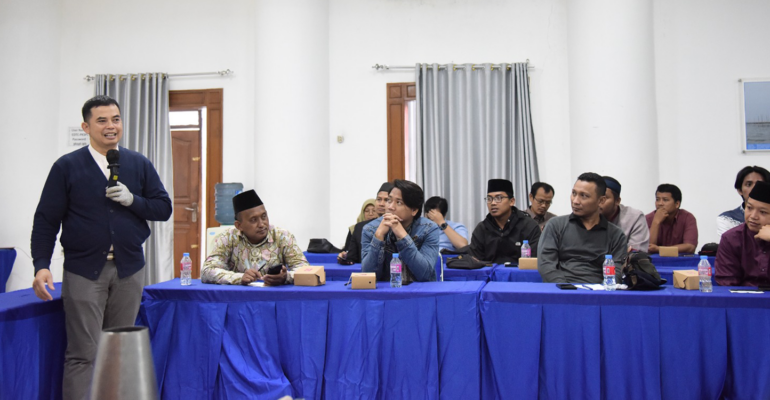HSC IPB University Holds Training on Qurbani Handling and Slaughtering for DKM Members and the Community

Halal Science Centre (HSC) IPB University in collaboration with the Institute for the Assessment of Food, Drugs, and Cosmetics (LPPOM) of the Indonesian Ulema Council (MUI) held a training on handling and slaughtering sacrificial animals. The training was aimed at mosque administrators, sacrificial committees and the general public.
Chief of HSC IPB University, Prof Khaswar Syamsu said, the training was a form of IPB University’s service to the community through socialisation activities on the procedures for slaughtering sacrifices according to Sharia. Hopefully, the participants can apply their knowledge in their respective areas.
In addition, this socialisation is a response to the implementation of sacrificial slaughter which still does not meet Islamic law. It is often found that the process and the post-slaughter process do not fulfil the aspects of ihsan to the animals and tayib aspects.
“We hope this training will benefit the slaughterer participants, DKM members, and sacrificial committees so that the knowledge gained can be practised when performing qurbani later in the community,” he said.
Ir Muti Arintawati, President Director of LPPOM officially opened the event. She said that the annual collaboration with HSC IPB University is part of LPPOM’s mission to increase public awareness of halal products. Moreover, based on the HSC IPB University survey in 2022, the number of halal-certified slaughterhouses (RPH) is still very small, below 15 per cent.
“Through this socialisation, it is hoped that it will increase the awareness of business actors and the public as users to take a role in providing knowledge, participate in supervising the process of slaughtering animals in the community and encourage halal certification of slaughterhouses and poultry slaughterhouses (RPU),” she explained.
Drs Aminudin Yakub, President Director of the MUI Professional Certification Institute (LSP) also shared insights related to exploring the Sharia and Fiqh aspects of the Sacrifice. He explained that the main requirement of qurbani is to do ihsan or good to the animal.
In addition, the sacrificial animals must fulfil animal health standards in accordance with laws and regulations. Another important thing is that the slaughterer must not only understand, but also be an expert who has been certified by LSP.
“Expert slaughterers need to ensure the slaughter process is carried out quickly and precisely to ensure the halalness of the meat and ensure the death of the animal is due to the slaughter process, not other actions,” he said.
Dr drh Supratikno PAVet, Lecturer at School of Veterinary Medicine and Biomedical Sciences (SKHB) IPB University and HSC Researcher IPB University emphasised that the slaughtering process must apply five principles of animal welfare. These principles are freedom from hunger and thirst, freedom from discomfort, freedom from pain, injury and disease, freedom from fear and stress, and freedom to express natural behaviours.
“These five principles are important to understand because they relate to the handling of various types of sacrificial animals. In addition, it determines the quality and halalness of the meat so that it remains in accordance with the main postulate of ihsan towards animals,” he said.
In addition to theory, the trainees also gained understanding through hands-on practice. Dr Supratikno practised various methods of cattle slaughtering, goat slaughtering procedures, and post-slaughter carcass handling processes. (MW/Rz) (IAAS/RUM)



